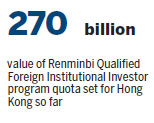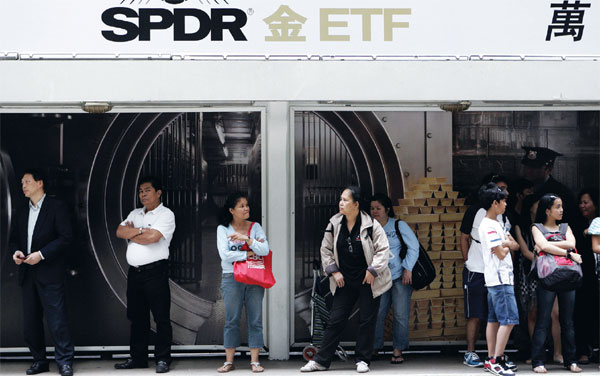CSOP fund offers 'short' access to priciest stocks
Updated: 2015-05-16 07:29
By Bloomberg(HK Edition)
|
|||||||
CSOP Asset Management Ltd is handing Hong Kong investors a way to bet against the mainland's most expensive stocks.
The CSOP SZSE (Shenzhen Stock Exchange) ChiNext ETF (exchange-traded fund) became the first exchange-traded fund in Hong Kong to track the ChiNext index of small-company shares when it started trading on Friday, according to Jack Wang, managing director at CSOP.
The ChiNext has surged 113 percent in Shenzhen so far this year, against a 35-percent gain for the benchmark Shanghai Composite Index.
The mainland small-cap companies are trading near record highs after the government pledged to support developing industries, including technology and health care, to shift the economy away from manufacturing and property development. The ChiNext is valued at 109 times reported earnings, five times higher than the Shanghai gauge's level.
"There are funds that want to go short ChiNext, thinking the valuation is too high," Wang said earlier this week. "They could do so with this ETF. Of course, we've also seen interest in buying ChiNext on bets earnings growth will leap."
The small-cap index has climbed this year ahead of the expected launch of the Shenzhen-Hong Kong Stock Connect program, which will expand foreign investors' access to smaller companies.
Hong Kong Exchanges and Clearing Ltd (HKEx) is preparing for the Shenzhen program to begin in the second half of this year, while the date may be announced late next month, according to HKEx Chairman Chow Chung-kong.
Leshi Internet Information and Technology Co, a maker of web-enabled TVs, has surged more than 400 percent for the best performance on the ChiNext this year. The stock trades at 367 times earnings, while software company Beijing Egova Co has a multiple of 160 after jumping 326 percent.
The ChiNext gained 0.1 percent at Friday's close, reversing a 2.6-percent loss. The Shanghai Composite Index dropped 1.6 percent.
Using the ETF for shorting is "risky", said Ben Kwong Man-bun, a director at brokerage KGI Asia Ltd in Hong Kong.

"The mainland market is not a sensible market. It's driven by speculation and based on momentum and market rumors, so it's very difficult to judge the price rationally," Kwong said.
The ChiNext is forming an unprecedented bubble as mutual funds have heavy positions in the stocks and retail investors buy them regardless of fundamentals, according to an article written by Wu Lihua in the Economic Information Daily, which is operated by Xinhua News Agency.
US investors are already able to trade in Chinese mainland small-cap stocks though the Market Vectors China AMC SME-ChiNext ETF, which has climbed 84 percent in New York this year.
CSOP is using its quotas under the Renminbi Qualified Foreign Institutional Investor (RQFII) program for the ChiNext ETF, while it utilized the Shanghai link for about 30 percent of trades for its CSOP FTSE China A50 ETF, Wang said.
The asset manager had 46.1 billion yuan ($7.4 billion) of RQFII allocations as of April 28, the world's largest, according to the State Administration of Foreign Exchange. The mainland has granted all of the 270-billion-yuan quota set aside for Hong Kong.
"With the connect, we have freed up some RQFII quotas and now have sufficient amount for the ChiNext ETF," said Wang. "We won't rule out using other channels for the ChiNext ETF when they are available. That could allow us to use RQFII for our fixed-income products."
|
The CSOP SZSE ChiNext ETF became the first exchange-traded fund in Hong Kong to observe the ChiNext index of small-company shares when it started trading on Friday. The newly established ETF will enable foreign investors to look into Shenzhen-listed mainland small caps tracked by the ChiNext index, which has soared 113 percent so far this year after the central government pledged to support developing industries. Dale de la Rey / Bloomberg |
(HK Edition 05/16/2015 page6)
